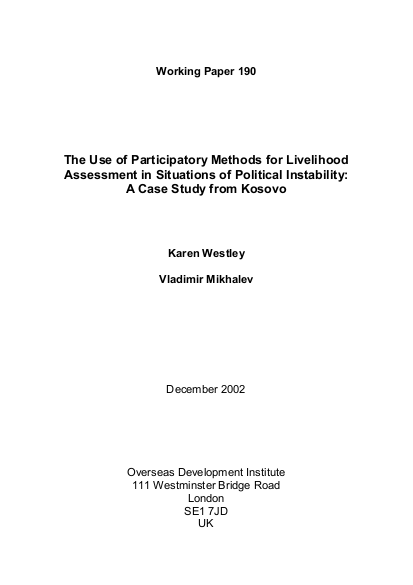
This Working Paper reviews the methodology used for a qualitative poverty assessment of Kosovo carried out in July 2000, then draws lessons learned. The purpose of the assessment is summarised along with a description of the group that commissioned the work. An overview of the process used to develop the methodology includes discussion of the use of the livelihoods framework to assess vulnerability in a situation of chronic conflict and political instability (SCCPI) in relation to other poverty and humanitarian assistance frameworks. The specific methodology used, including training, implementation and analysis of findings is briefly reviewed. The use of participatory methods in a conflict situation is discussed and alternative methods described. The challenges of linking community findings with macro-economic and political trends are highlighted. The question of whether or not the selected approach was the most appropriate concludes the section on methodology.
A selection of key findings and policy recommendations make up the fourth section of the paper, followed by a fifth section on lessons learned. In a final section, the authors comment upon the extent to which operating agencies in Kosovo built upon the findings in their strategies and practices, and on the impact of the process and training on the Kosovar development practitioners who carried out the field work and contributed to the analysis.
Resource collections
- Accountability to affected populations (AAP)
- ALNAP focus topics
- Evaluating humanitarian action
- Monitoring and Evaluation (M&E)
- Monitoring of humanitarian action
- UN Habitat - Urban Response Collection
- Urban Response - Urban Crisis Preparedness and Risk Reduction
- Urban Response Collection - Community Engagement and Social Cohesion
- Urban Response Collection - Economic Recovery
- Urban Response Collection - Environment and Climate Change
- Urban Response Collection - Housing, Land and Property
- Urban Response Collection - Urban Crisis Response, Recovery and Reconstruction
- Urban Response Collection - Urban Resilience
- Use of evaluation evidence